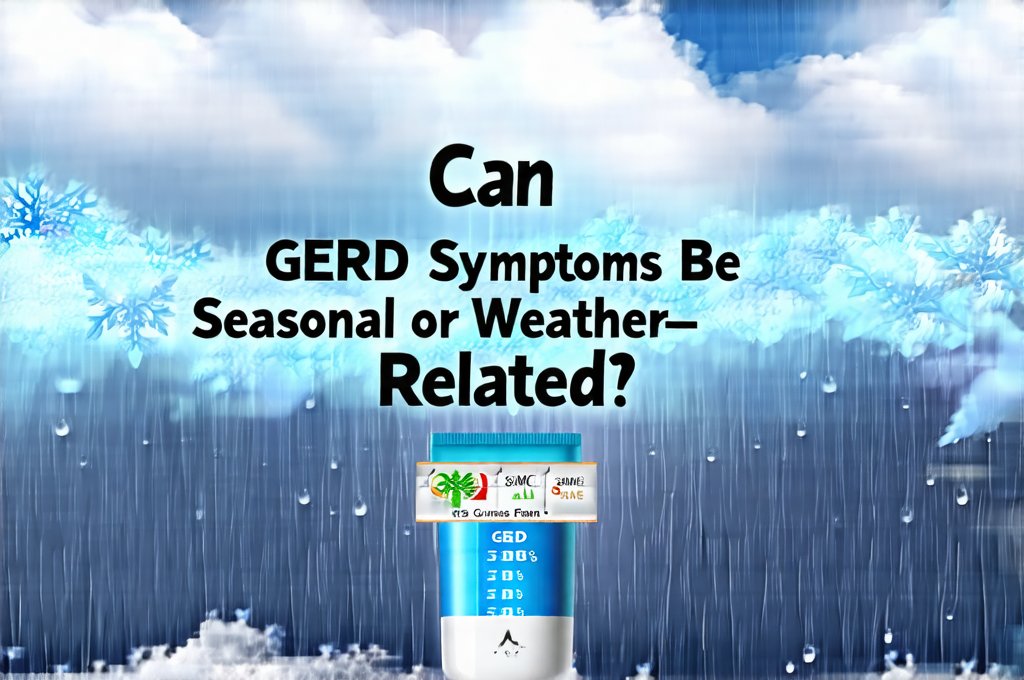Gastroesophageal reflux disease (GERD) affects millions worldwide, presenting as heartburn, regurgitation, and sometimes more subtle symptoms like chronic cough or chest pain. Many individuals experience fluctuations in their GERD symptoms, noticing periods where they’re significantly worse and others where they’re barely noticeable. While lifestyle factors and dietary choices are often blamed, a less-discussed aspect is the potential influence of seasonal changes and weather patterns on these troublesome symptoms. It’s not uncommon for people to report a worsening of GERD during specific times of the year, prompting questions about why this might occur and what can be done about it. Understanding this connection isn’t about finding a “cure” based solely on the calendar; it’s about recognizing potential triggers and adapting management strategies accordingly.
The link between weather/seasonality and GERD is complex and not fully understood, but emerging evidence suggests multiple contributing factors. Changes in barometric pressure, temperature fluctuations, humidity levels, pollen counts, and even alterations in daily routines associated with different seasons can all play a role. This isn’t to say everyone will experience seasonal GERD, or that it’s the primary cause for most sufferers. Rather, individuals already predisposed to GERD may find their symptoms are exacerbated during specific times of year due to these external influences interacting with their existing sensitivities and health habits. It’s a nuanced relationship requiring careful consideration.
Seasonal Variations in GERD Symptoms
The most frequently reported pattern is an increase in GERD symptoms during spring and fall, coinciding with allergy season and back-to-school/holiday shifts in routine. Pollen levels surge in spring, triggering allergic rhinitis (hay fever) which can directly worsen GERD. This happens because postnasal drip associated with allergies irritates the esophagus, increasing acid reflux. Fall often brings similar pollen increases from ragweed, plus a return to more indoor activities and potentially changes in diet as comfort foods become more appealing. Beyond allergies, these seasons mark transitions – shifts in sleep patterns, stress levels (related to school or work demands), and dietary habits can all contribute. Recognizing how [can gut symptoms be seasonal] may impact your health is crucial.
Temperature swings are also significant. Cold weather often leads to increased consumption of rich, fatty foods for comfort, which are known GERD triggers. Additionally, layering up in clothing can increase abdominal pressure, potentially pushing stomach acid upwards. Conversely, warmer temperatures may encourage outdoor activities with less structured eating patterns – grabbing quick, convenient (and potentially triggering) meals or snacks on the go. The body’s natural response to cold—constricting blood vessels—may even affect digestive processes, slowing down gastric emptying and increasing reflux risk.
Finally, changes in humidity can play a role. Low humidity during winter months can dry out the esophageal lining, making it more sensitive to acid irritation. High humidity levels, on the other hand, may contribute to mold growth indoors, which is another potential allergy trigger that could exacerbate GERD symptoms. It’s important to remember this isn’t one-size-fits-all; individual responses will vary greatly depending on personal sensitivities and pre-existing conditions. Understanding [can intolerances be temporary or permanent] can also help you navigate dietary changes.
The Role of Barometric Pressure
Barometric pressure – the weight of the atmosphere – fluctuates with weather systems. Several studies have suggested a correlation between falling barometric pressure (often preceding storms) and increased GERD symptoms. While the exact mechanism isn’t fully understood, one theory proposes that changes in atmospheric pressure can affect the abdominal cavity, potentially leading to greater pressure on the stomach and esophagus. This increased pressure may then facilitate acid reflux.
- It’s thought that a sudden drop in barometric pressure creates a difference in pressure between the abdomen and the atmosphere, causing gas within the digestive system to expand.
- This expansion can push stomach contents upwards into the esophagus.
- The effect is often subtle, but for individuals with a weakened lower esophageal sphincter (LES) – the muscle that prevents acid reflux – even slight changes can be enough to trigger symptoms.
It’s crucial to note that research on this topic is ongoing and somewhat conflicting. Some studies have found strong correlations while others haven’t. However, many GERD sufferers report noticeable symptom flare-ups before or during stormy weather, suggesting a real phenomenon for some individuals. Paying attention to your own body and tracking symptoms in relation to weather patterns can help identify potential personal triggers. [Can gut symptoms be a warning sign]? It’s worth exploring if you notice patterns.
Dietary Shifts & Seasonal Eating
As mentioned earlier, dietary habits often change with the seasons. During colder months, people tend to gravitate towards heavier, more processed foods – rich sauces, fried foods, sugary treats – all of which are known GERD aggravators. These foods typically take longer to digest, increasing the risk of reflux, and can also weaken the LES. Comfort food is comforting for a reason, but it often comes at a cost for those with GERD.
Conversely, summer barbecues and outdoor gatherings may lead to increased consumption of acidic foods like citrus fruits, tomatoes, and spicy marinades. While these foods are enjoyable in moderation, they can irritate the esophagus and trigger heartburn. Furthermore, changes in hydration levels – drinking less water in colder weather or more sugary drinks in warmer weather – can also impact digestive health and GERD symptoms.
- Consider focusing on [can seasonal produce support gut diversity] to aid digestion.
- Prioritize lean proteins and whole grains year-round.
- Stay hydrated with water throughout the day, regardless of the season.
Stress & Routine Disruptions
Seasonal changes often disrupt established routines, leading to increased stress levels. Back-to-school for families, holiday preparations during fall/winter, or simply adjusting to shorter daylight hours can all contribute to feelings of overwhelm and anxiety. Stress is a well-known GERD trigger, as it increases cortisol production, which can affect digestive function and LES tone. If you find your symptoms worsen with stress, consider if [can gut symptoms be a sign of burnout].
Furthermore, changes in sleep patterns are common during seasonal transitions. Less sunlight in winter can disrupt melatonin production, leading to difficulty sleeping or poor sleep quality. Inadequate sleep weakens the body’s natural defenses and can exacerbate GERD symptoms. Even seemingly minor disruptions – like travel for holidays or vacations – can throw off your routine and trigger flare-ups.
- Practice stress-reducing techniques such as yoga, meditation, or deep breathing exercises.
- Maintain a consistent sleep schedule as much as possible, even during seasonal changes.
- Plan ahead to minimize stress associated with holiday preparations or travel. [Can music or light affect gut symptoms] might also offer some relief.
It’s important to remember that managing GERD is often about identifying individual triggers and adopting strategies to mitigate them. Seasonal and weather-related factors can be significant contributors for some individuals, but they are rarely the sole cause of symptoms. By understanding these potential influences, you can proactively adjust your lifestyle and management plan to minimize discomfort and improve your overall well-being throughout the year. [Can reactions be a sign of gut healing]? Paying attention to changes in your body is key.


















